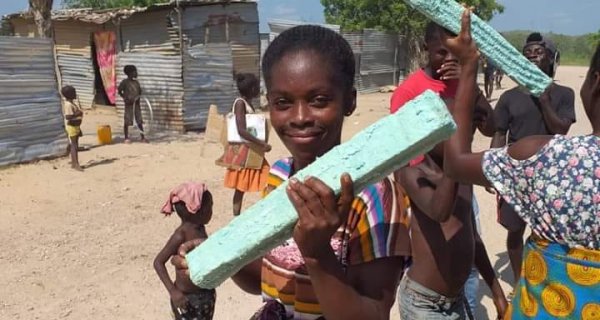Fernanda Renée, creator of Ambirecicla and mentor of this project, gathered volunteers and partners in an improvised factory in Calemba II, municipality of Talatona, in Luanda, and proposes to produce 70 thousand bars of soap.
For now, about 40 thousand bars have been delivered which, besides contributing to cleaner hands, also help to eliminate used cooking oils in a non-polluting way.
Forty-two bars of soap mean that 36 litres of oil are no longer dumped in the environment.
Fernanda Renée started producing soap this way 4 years ago in her 'start up' aimed at fighting poverty through recycling, and has been dedicated in solidarity to this project since the beginning of the state of emergency in the country almost 50 days ago.
"In this phase of the pandemic we have left our commercial production to devote ourselves to voluntary production," he told Lusa, stressing that one of the methods of preventing the coronavirus is precisely hand washing.
"In the market, prices have risen dramatically, before it was 500 kwanzas, now it's at 1,800 kwanzas," said Fernanda Renée.
As a result, many disadvantaged families no longer have access to this product and Fernanda has decided to join other partners in producing and distributing bars of soap for free: "Our motto is not to leave anyone behind in this outbreak of a pandemic".
Every day, about a thousand bars are produced, in an essentially artisanal process.
Water, oil and caustic soda - and a bit of blue dye, which makes soap more to the taste of women - are added to a vat in a mixture that thickens to a paste consistent enough to be poured into the mould.
There, the mixture will have to wait several hours to harden sufficiently and be cut into bars.
The soap has to be cured for at least 24 hours before it can be distributed.
As the oils, collected in homes, restaurants and business centres, are different, each bar is unique in its formulation.
That's why the work of António Quilala, one of the volunteers of Química Verde Lab, who collaborates in the project is essential to control the quality of the raw material, the production process and the final product.
"What we do is define the proportions of water, oil and sodium hydroxide according to the quality of the oil we receive" to ensure that the product can be used safely, he explains.
He also highlights the role of volunteering in Angola: "It's very important as we have many people who are not in a position to guarantee their own sustainability. Those who can do something for others can change people's lives and give at least a touch of magic with their support".
The Brazilian Malaquize Bertulucci, who works in the area of recycling and environmental education, helps with the collection of oils, which she brings once a week, "so that the work doesn't stop", collecting, on average, between 320 and 340 liters.
"We are very committed to this, it's a way to avoid soil contamination and to be close to the communities at such a difficult time," says the volunteer.
To reach those who need it most, Fernanda Renée relies on the surveys made by local administrators in collaboration with the neighborhood coordinators.
And there are many in need, like the 200 families of Lalama, a remote community in the municipality of Icolo Bengo, in the province of Luanda.
To reach this commune, it is necessary to leave the main road and travel about 20 kilometres from an appropriate road for all terrain vehicles.
Finally you reach Lalama, a cluster of houses made of sheet metal, where the inhabitants have no water, no electricity, no medical post, no schools or transport, and often no food.
The initial joy of the visitors' arrival is followed by some disappointment, when the residents realize that the donation is just bars of soap.
With the rains, the agricultural land has flooded and they go hungry, they lament.
There are those who are satisfied with the soap, but there are also those who complain why so many other things are missing and even those who disdain the quality of the soap. The volunteers promise to improve, while raising the awareness of a group of children who are attentive to washing their hands.
Eva João Mateus is grateful for the bars of soap she received and that "it's difficult" to arrange at this time, but she says that what really helped "was the farming [agricultural land]".
"All the ploughing was with the water. Now to take a bunch of bananas to go to the 30 [market] to buy a bar of soap is very costly", she comments.
And he explains: "It's not just the soap, help us with more things because here we are lacking everything, it's salt, it's oil, it's fuba, we need everything".
Paulo Mota says that soap is useful "to help fight the coronavirus in hand washing" and is only bothered by the lack of electricity. As for the water, he says that the river is "near", at most 30 minutes.
The neighbourhood coordinator, Angelino de Castro Júnior, confirms the shortcomings pointed out by the population, including a lack of drinking water, calling for more support for the inhabitants of Lalama, and explains how he has made the population aware of the dangers of the disease.
"I communicate with the community here in our jango [meeting point]. I call on each citizen to wash their hands with soap, to avoid watching soap operas, to avoid transporting from one side to the other: it has to be from river to house, from farm to house, and we have to distance ourselves one meter from each other".
But why the soap operas? "Because soap operas bring people together", he justifies. As the village has no power, the families gather to watch television in the houses with a generator, which in times of pandemic seems to be more counter-indicated than poverty.







